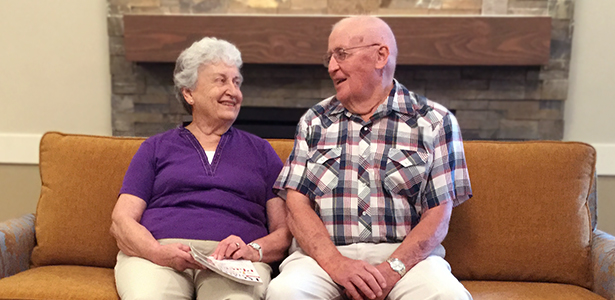January 2020 Resolutions
A resolution for a new year—and a new life
As we begin a new year (and a new decade!), plenty of us think up resolutions to improve our quality of life. Losing weight, eating healthier, and maintaining better relationships usually top the list. One major life event that many people put off is preparing for retirement—and we don’t mean just financially. The decision to move to a retirement community is a significant one, and the process involves planning and sometimes waiting.

Reasons people put moving off
Just as people put off starting a new exercise regimen, it’s easy to procrastinate on choosing a retirement community. One of the most common reasons we hear is “The idea of moving is overwhelming!” and its corollary, “I don’t need assistance yet.”
At Bridgewater, our average move-in age is 77, younger than the national average, and some residents move here in their 60s. They want to enjoy their retirement without the care of major home maintenance and yard work, and they want to do it while they are still fully active. In other words, they want to make the most of Independent Living while knowing that additional support will be available through assisted living or nursing households.
“Plenty of residents say they wish they had moved sooner,” says Crista Cabe, Bridgewater’s Director of Marketing & Sales. “No one says ‘I wish I had waited longer to move!’” Rodney Alderfer, Bridgewater’s president, agrees: “The ideal time [to move] is when you are active, healthy, and can take full advantage of community benefits. Without homeowner responsibilities, you can focus on whatever it is that means the most to you. The world gets bigger, not smaller.”
Action items
Once you decide the time is right, there are several action items you may need to address.
The first, as we alluded to earlier, is to review your finances. Many residents were hesitant to open the books at first until they realized a retirement community was more affordable than they expected. Remember to consider future sources of income, such as maturing investments. BRC marketing counselors will be happy to do a preliminary assessment and help you understand what type of residence at BRC would comfortably fit your budget.
Just as important is to talk with your family, especially your children. Their insights and support can be invaluable. Moving to a retirement community is an important step in your life, and your family should be involved in the decision.
Start thinking about downsizing. Many Americans recognize that we could pare down the possessions we’ve accumulated over the years. Especially after raising a family, the prospect of sorting through stuff—and memories—can be daunting. You’re not alone! Just take it a step at a time and think it through. If you want assistance there are experts who help people “right-size” and companies that offer a transition package combining moving services for what you decide to take with you and an auction of remaining items.
Visit retirement communities. Obviously, you need to find a community that’s right for you and your family. Is it an active place in a walkable neighborhood? Can it provide for your future needs? How is the dining, and is the plan flexible enough for your preferences? And are the people compatible and welcoming? Always remember you are there not to give things up, but to live a full life.
Why sooner is better
Once you find a retirement community, you may be placed on a waiting list. This is why it’s important to act sooner rather than later. At BRC, if you want a home style that is much in demand, you may need to wait a year or more for one to open up. In other cases, your top choice may be available within a few months.
Whatever your decision, make it deliberately and with eyes wide open. If you have any questions, please contact us. We can help advise you in assessing your finances and deciding if a move to BRC is right for you. Maybe 2020 will be the year for a new resolution.

